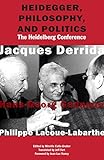Heidegger, Philosophy, and Politics : The Heidelberg Conference / Jacques Derrida, Hans-Georg Gadamer, Philippe Lacoue-Labarthe; ed. by Mireille Calle-Gruber.
Material type: TextPublisher: New York, NY : Fordham University Press, [2016]Copyright date: ©2016Description: 1 online resource (116 p.)Content type:
TextPublisher: New York, NY : Fordham University Press, [2016]Copyright date: ©2016Description: 1 online resource (116 p.)Content type: - 9780823273669
- 9780823273690
- 193 23
- B3279.H49 C654513 1988eb
- online - DeGruyter
- Issued also in print.
| Item type | Current library | Call number | URL | Status | Notes | Barcode | |
|---|---|---|---|---|---|---|---|
 eBook
eBook
|
Biblioteca "Angelicum" Pont. Univ. S.Tommaso d'Aquino Nuvola online | online - DeGruyter (Browse shelf(Opens below)) | Online access | Not for loan (Accesso limitato) | Accesso per gli utenti autorizzati / Access for authorized users | (dgr)9780823273690 |
Browsing Biblioteca "Angelicum" Pont. Univ. S.Tommaso d'Aquino shelves, Shelving location: Nuvola online Close shelf browser (Hides shelf browser)

|

|

|

|

|

|

|
||
| online - DeGruyter Before the Fires : An Oral History of African American Life in the Bronx from the 1930s to the 1960s / | online - DeGruyter Brooklyn Bridge Park : A Dying Waterfront Transformed / | online - DeGruyter Citizen Subject : Foundations for Philosophical Anthropology / | online - DeGruyter Heidegger, Philosophy, and Politics : The Heidelberg Conference / | online - DeGruyter The Muses on Their Lunch Hour / | online - DeGruyter Teaching Bodies : Moral Formation in the Summa of Thomas Aquinas / | online - DeGruyter The Disavowed Community / |
Frontmatter -- Contents -- Foreword -- Preface -- Event of the archive -- Conference of February 5, 1988 -- Meeting of February 6, 1988 -- Appendix: "like Plato in Syracuse" -- Notes
restricted access online access with authorization star
http://purl.org/coar/access_right/c_16ec
In February 1988, philosophers Jacques Derrida, Hans-Georg Gadamer, and Philippe Lacoue-Labarthe came together in Heidelberg before a large audience to discuss the philosophical and political implications of Martin Heidegger's thought. This event took place in the very amphitheater in which, more than fifty years earlier, Heidegger, as rector of the University of Freiburg and a member of the Nazi Party, had given a speech entitled "The University in the New Reich." Heidegger's involvement in Nazism has always been, and will remain, an indelible scandal, but what is its real relation to his work and thought? And what are the responsibilities of those who read this work, who analyze and elaborate this thought? Conversely, what is at stake in the wholesale dismissal of this important but compromised twentieth-century philosopher?In 1988, in the wake of the recent publication of Victor Farias's Heidegger and Nazism, and of the heated debates that ensued, these questions had become more pressing than ever. The reflections presented by three of the most prominent of Heidegger's readers, improvised in French and transcribed here, were an attempt to approach these questions before a broad public, but with a depth of knowledge and a complex sense of the questions at issue that have been often lacking in the press. Ranging over two days and including exchanges with one another and with the audience, the discussions pursued by these major thinkers remain highly relevant today, especially following the publication of Heidegger's already notorious "Black Notebooks," which have added another chapter to the ongoing debates over this contested figure. The present volume recalls a highly charged moment in this history, while also drawing the debate toward its most essential questions.
Issued also in print.
Mode of access: Internet via World Wide Web.
In English.
Description based on online resource; title from PDF title page (publisher's Web site, viewed 02. Mrz 2022)


